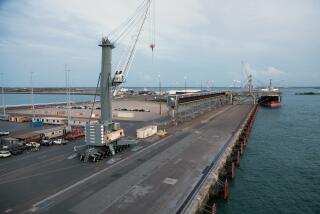Will Hong Kong Remain Asia’s Listening Post?
- Share via
TOKYO — What happens to Hong Kong after it reverts to Chinese rule this summer has been a particularly hot topic of discussion in Asia this year. From all indications, the Chinese government is fully aware of the fact that Hong Kong is the goose that lays the golden eggs.
It also recognizes that its ability to govern Hong Kong well will be viewed worldwide as the test case of whether China can live up to its commitment to modernization. From this perspective, China is likely to do all it can to maintain the status quo in Hong Kong, and there should be no significant changes immediately following the hand-over.
Although the Chinese know Hong Kong is important, there is still some doubt whether they know why it is so important. The fact is that Hong Kong is one of the leading financial centers in the world. As such, its importance is not so much in how many stocks and bonds are traded there, but in the information that’s available there and the way in which it is analyzed.
A financial center is a place where information is collected, analyzed, distilled and disseminated. Hong Kong is well-equipped to do this, having gained a reputation as the best place to understand what is going on in Asia. But if Hong Kong is to retain its position as Asia’s prime listening post, information must be able to flow in and out of the China-controlled Hong Kong as easily as it does in New York and London.
The problem is the Chinese government has been doing just the opposite on the mainland for some five decades. To the Chinese government, censoring information is second nature. Indeed, even to this day, Chinese officials are routinely putting enormous pressure on news organizations to suppress information not only in China, but also in Japan and elsewhere in Asia.
The slightest attempt by China to interfere with or manipulate information would seriously compromise Hong Kong’s reliability as a news center. For example, if the Chinese government were to censor certain Reuters dispatches or CNN reports, it would send the message that only information favorable to the Chinese government could be obtained in Hong Kong. This would most probably end Hong Kong’s role as a financial center because money is such a skittish commodity. People would not entrust their money with fund managers in Hong Kong if they felt that those managers did not have full access to vital information.
China will eventually learn all this through trial and error. The problem is that this means some errors will be committed, and some may choose to move their businesses elsewhere.
Under the new one-country, two-system policy, Chinese officials could be forced to equivocate on various issues. For instance, to be credible in the international financial circles, Chinese officials will have to speak more frankly in Hong Kong. On the mainland, however, sticking with the party line is important. Similarly, it is one thing for China’s leaders to allow British subjects to openly criticize the Chinese government, but it is quite another to let its own citizens (even in the new Hong Kong) do it.
In short, to maintain Hong Kong as a free and vibrant international financial center, it may be necessary, ironically, to erect even higher political barriers between Hong Kong and the mainland. That would require a very strong leadership in Beijing, and whether China’s leaders are willing and able to make those hard decisions is very much still an open question.
More to Read
Sign up for Essential California
The most important California stories and recommendations in your inbox every morning.
You may occasionally receive promotional content from the Los Angeles Times.










